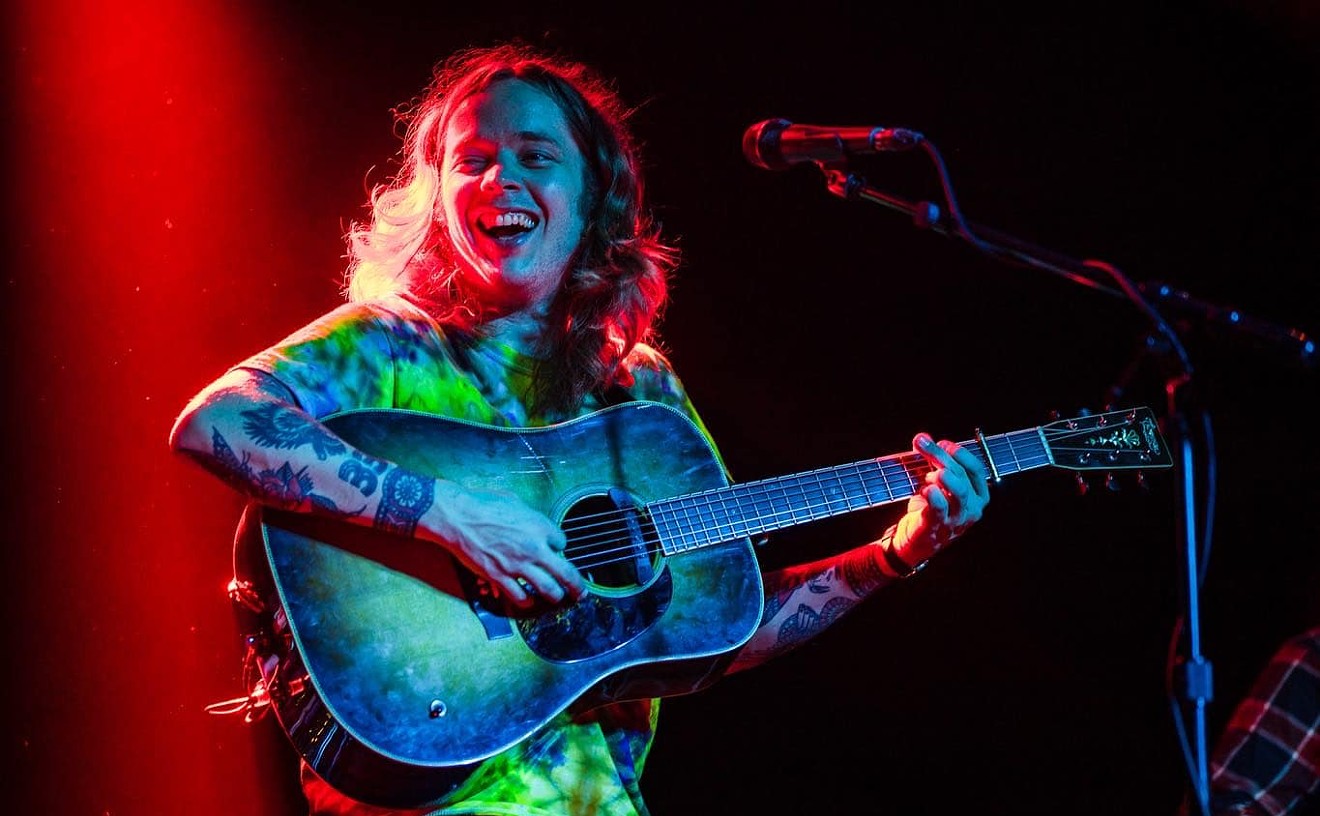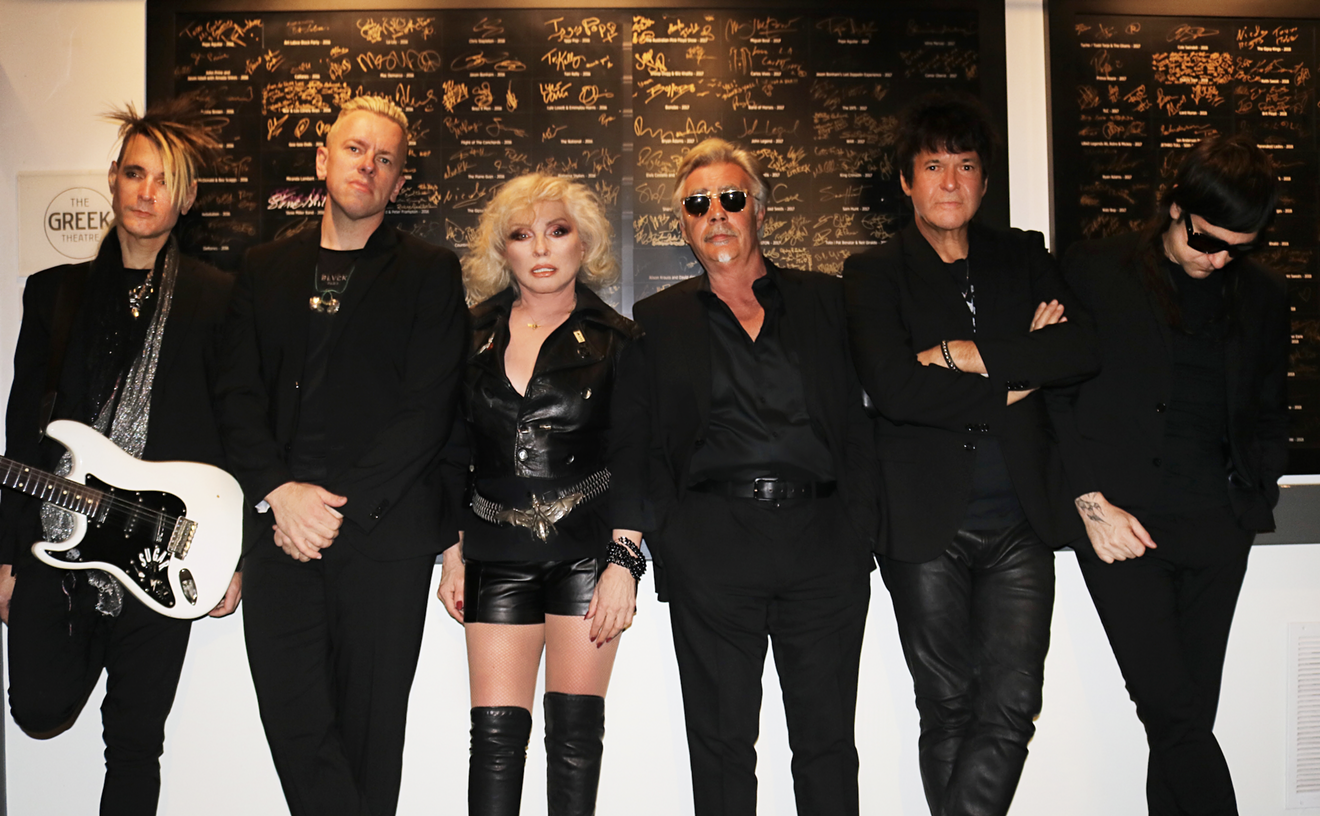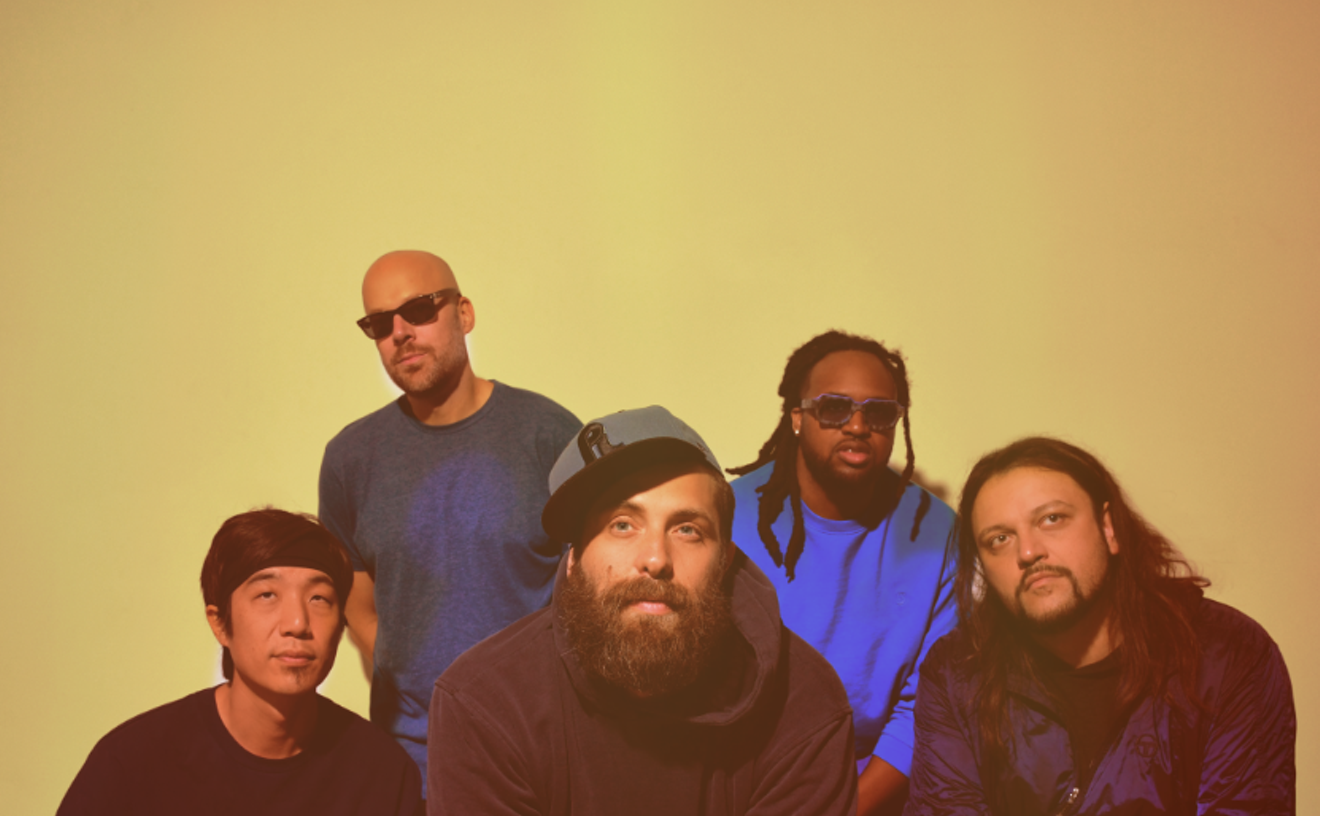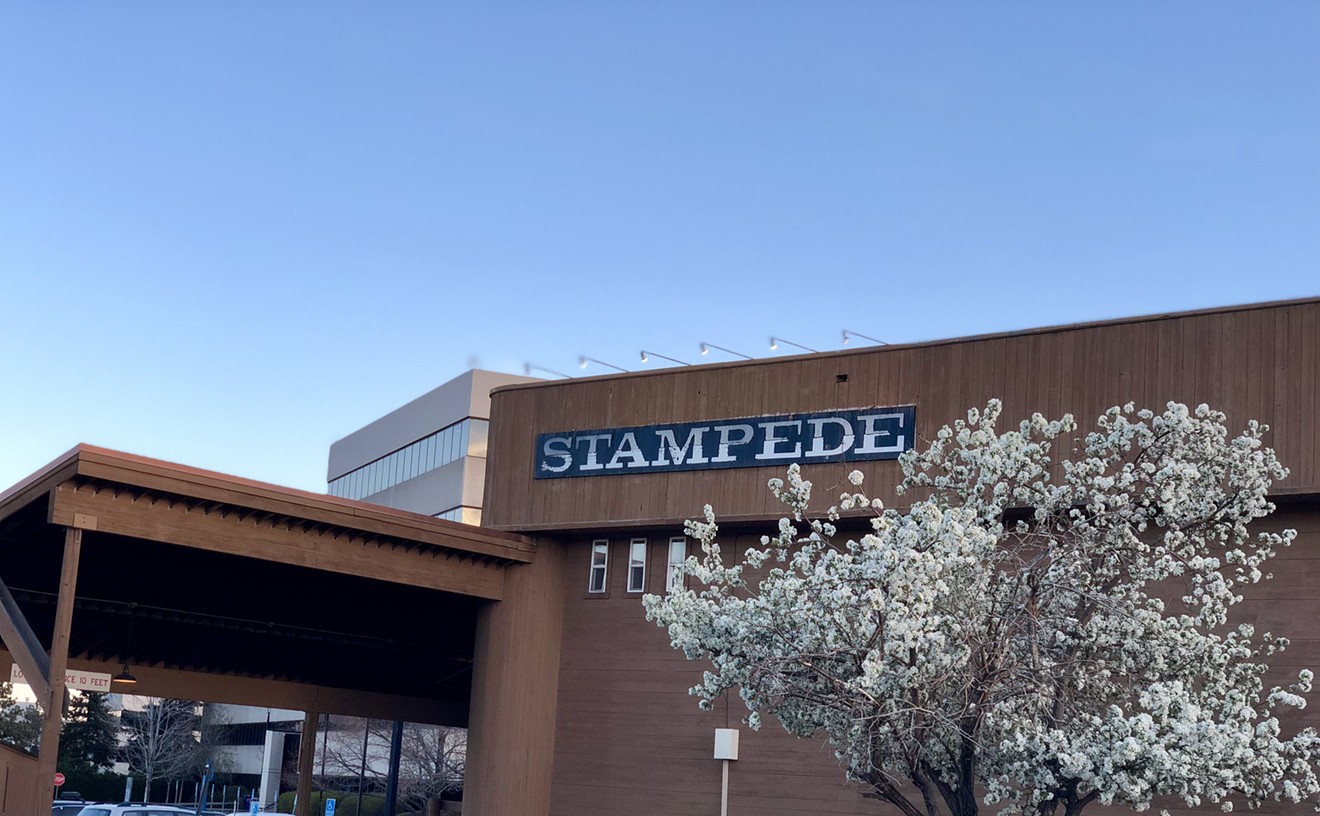The happening has attracted a devoted following, and no wonder. On Thursdays, when Playscool is in session, Tracks is transformed into an unrivaled entertainment zone where hipster teens and club-friendly young adults are able to act out their wildest fantasies while sporting high-fashion accoutrements, the messiest tri-color hairdos imaginable and omni-sexual makeup that would make even the trendsetters in London keel over in euphoria. On one recent night, gay couples were making out in corners as what looked like a high-school quarterback was checking out his Park Meadows-bought Armani clubwear not five feet away. Later, girls in the boys' restroom straightened their hair while discussing an upcoming algebra test that was the likely cause of their anxious expressions. Odds are good that instead of memorizing equations, they'd spent much of their time busting moves in front of their bedroom mirrors in anticipation of Playscool's Intellibeams.
Taken as a whole, Playscool is a gender-bending brew of couture and pop savvy that's as aesthetically challenging as it is psychically void. Franconi, however, sees Playscool not as a weekly tribute to decadence, but as a utopian experiment in which his students are learning the importance of acceptance. "We've created an environment where it doesn't matter who you are, what you are, where you grew up or what you look like," he says. "You come here to be your true self, and you leave your preconceptions at the door. You're not here to criticize or look down on anyone, and you can be friends with anyone.
"What I want to do in the music industry and in the clubs is to educate," the Playscool master adds. "I think it's important to give the people--and in this case, the kids at Playscool--more than what they expect."
The man currently reigning over this seething manifestation of teenage titillation had a somewhat rootless boyhood. "I was born in San Francisco," he says, "but as a family, we moved to a lot of different places--especially around California--in my formative years." Following young Kekoa's seventh birthday, however, a longer leap was completed: The clan deserted the Left Coast state, which Malcolm McLaren once described as the spot "where Western Civilization hit the beach," in favor of Hawaii, where many of his relatives reside. But even though Franconi enjoyed his time in paradise, ten years of it proved to be enough for him. "I left Hawaii at seventeen," he says. "It's a beautiful place to grow up, but I felt out of place there, because I have ideas I want to put into motion, and Hawaii is too small for that."
Keoki understood his sibling's feelings perfectly: He'd moved from Hawaii to New York City several years earlier, attracted by one of the world's best club scenes. He was working as a go-go dancer at a venue called the Area when he was given his first chance to deejay, and before long, he and a cohort, Michael Alig, were making waves with themed events--most famously Disco 2000, which kicked off in 1989. According to Franconi, who witnessed many of these elaborate bashes firsthand, the circus-like atmosphere Keoki and Alig created was a big inspiration. "Once the place was decked out like a gigantic chess board, with a ten-foot queen and king, and pawns all around you while you're dancing," he remembers. "A lot of time and effort was put into those parties--and that's when I realized what I wanted to do."
Not that Franconi didn't have other interests as well. In 1992 he moved to Colorado in order to attend Regis University, with an eye toward training for a very different career. "I majored in psychology and Spanish," he says. "I knew I wanted to work with psychology and in education, because I love kids." A 1996 internship in the Denver Public Schools system only made him more enthusiastic: "I started working with DPS as a paraprofessional until I got hired on as a kindergarten teacher--a job I continued until the end of last year." These days he's back at Regis, where he's pursuing a master's degree in psychology that he'll be able to draw upon when he returns to the classroom. He rejects the idea that he'll someday have to choose between Playscool and real school. "Some people think that teaching and nightlife are total opposites," he says, "but I don't agree with that. The whole time I was in school, I was still traveling and working with my brother."
Indeed, Keoki spent a lot of time on the road during the early Nineties, a period when his fame in New York led to bookings across the globe. But in 1996, a drug bust and the suspicious death of a notorious club kid at Limelight, the venue where Disco 2000 was based at the time, came close to stopping his momentum. "Everything was in turmoil," Franconi says. "That's why I went to New York to visit him. I felt like my brother and I were very distant from each other, and I thought we needed some time to get close again."
During his reunion with Keoki, "I could see he was no longer happy," Franconi notes. "So one night when he was at the club, I hired three movers to come over and pack up his house. And then I told Keoki, 'Okay, I'm leaving. Here's your plane ticket. You're coming to Denver.'" Keoki did as ordered; he was in the Mile High City by the end of the week, joined shortly thereafter by a scandal-plagued Alig. The three subsequently came up with Disco 2000 II, an event that debuted at Club Synergy in the fall of 1996, with DJ Keoki behind the boards. The huge popular response that greeted the extravaganza gave Franconi the promotional clout he enjoys to this day--and Playscool, which bowed a year later, has only enhanced his reputation. "Keoki opened it up for us on the first night," he says. "We'd advertised it with these test-tube fliers that really told the scene that we wanted to do something different.
"The music industry moves across the country from east to west, bringing with it new ideas," he goes on. "It starts in New York and eventually reaches the opposite coast. And I wanted to help bring that to Denver--to give the kids something interesting to do, something they wouldn't mind taking their wallets out to participate in."
The energy that radiates from Playscool has everything to do with the age of the audience, Franconi believes. "The 21-and-up crowd isn't always into the music," he says. "They're looking for drink specials. But the kids--they're here for the environment we create and to dance their asses off, because they love the music."
Such sounds mainly appeal on a physical level, not an intellectual one. DJ Ty Tek, Playscool's main resident, concentrates on a hyper mix of house and trance that rarely contains prominent singing or meaningful lyrics, thereby providing the ideal backdrop for the preening and trendiness exhibited by the crowd. Franconi praises Tek and the rotating crew of fresh jocks for testing the limits of Tracks' state-of-the-art sound system. "The most important thing is to turn these kids on to music that they might not normally hear...that really happy Chicago house sound that just blows up all over." Other flavors are distributed to patrons in two different areas within Playscool. "If you don't like the house or trance room, you can check out the jungle room," he says. "And if that doesn't get you, you can go to the retro room." This last space, a concession to twentysomethings and regressing teens that's located in an extensive two-story addition, is frequently as packed as the main dance floor. "There are more retro kids than there are jungle kids," Franconi admits.
With Playscool running smoothly, Franconi is branching out with a variety of other projects. Under the umbrella of Superstar Productions, he oversees an impressive Web site (www.superstarproductions.com) and manages acts such as Gear Whore, Cirrus and Keoki, whom he's trying to convince to settle in Denver on a more permanent basis. (Right now Keoki is living in Hollywood, where he's working on remixes with Perry Farrell and Daniel Ash.) Franconi has also just launched Majik, an after-hours sequel to Playscool at Club Amsterdam that underlines his commitment to his adopted hometown. "I think Denver is a beautiful city, and I want to bring what New York City has to Denver--to show people what is possible," he says. "This is where I want to stay, and I want it to match up to what I've seen on the East Coast."
Local parents may not be cheered by this announcement--especially those who are disturbed by their sons' lipstick and hot pants and their daughters' fondness for midriffs that would make Cher blush. But Franconi sees their fears as misplaced. He's proud of Playscool and confident that the lessons he's teaching will last a lifetime. "The people growing up now have a history with dance culture," he says. "They know it because we gave it to them, and now they're going to take it wherever it needs to go in the future."
Playscool, with DJ Ty Tek. 9 p.m. Thursdays, Tracks 2000, 2975 Fox Street, $6, 303-654-9148.










